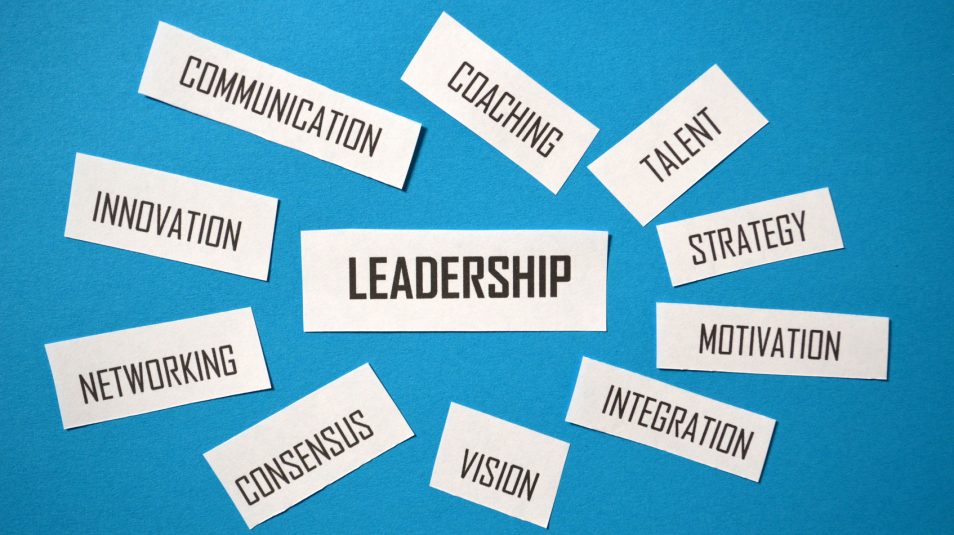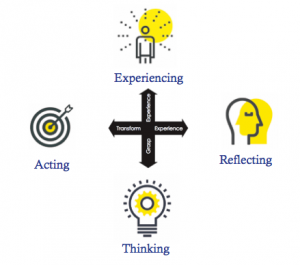Are You Learning to Lead?

As a leader, do you ever feel like your habits automatically engage to turn a new experience into an old pattern of response? If so, you might consider using a surprising approach to personal and professional development: learning from experience.
Many people think of Experiential Learning as being synonymous with its various applications: internships role-plays or even team-building ropes courses. In reality, Experiential Learning is a research-based methodology developed by David Kolb some 50 years ago when he identified an ideal process of learning (the learning cycle) and nine ways to approach that process (the learning styles). Kolb recognized that the way you approach learning is the way you approach leadership and life, in general; so, this mental model can help you approach any situation more effectively.
Here is the simple process to follow: Experiencing, Reflecting, Thinking and Acting:

- Experiencing. Attend to your experience in the moment.
- Reflecting. Pause to reflect on that experience to make meaning.
- Thinking. Engage in abstract thinking to generalize and make a decision.
- Acting. Take some action to implement your decision.
Ned used the learning cycle to approach a difficult conversation with a direct report, Chuck. He used Experiencing to connect with his own emotions, recognizing how the situation had triggered him. He also paid attention to the environment by selecting a time and location for the conversation to enhance his chances of a successful dialogue. He used Reflecting to take multiple perspectives on the situation so that he could better address Chuck’s point of view. Next, he collected the facts. He could point to the economic impact of Ed’s actions by reviewing financial reports. Finally, Ned used Acting to initiate the conversation and tap his courage to be direct.
Most people find that they prefer parts of the cycle and avoid or underutilize others. That’s because the learning cycle has two dimensions, each containing pairs of interdependent opposites. Experiencing (feeling) and Thinking are ways you take in information. Experiencing is subjective and direct, while Thinking is an interpretation that is generalized and objective. Reflecting and Acting are ways that you process your experiences and thoughts. You connect direct experience to general knowledge by Reflecting and transform abstract thinking into behavior by Acting.
Ruth realized that she preferred the Thinking and Reflecting steps of the process, and they had served her well in the practice of law. She was required to focus on facts and figures and make sense of them in the context of case law. When she became the practice group leader, she recognized that she was missing the upside potential of Experiencing (engaging in relationships and understanding emotions) and Acting (actively asking for new business opportunities). By intentionally focusing on these steps in the learning cycle, Ruth became more effective in her leadership role.
You can notice which parts of the process that you use when you are on automatic pilot, and whether you’re skipping parts of the process that could make you more effective in your leadership approach.
By including all the steps, regardless of their order, you’ll make sure that you are including all parts of you—your feelings, perceptions, thoughts and actions. The learning cycle reminds you that learning requires deep trust in your own experience and a healthy skepticism about information. It demands both the perspective of quiet reflection and a passionate commitment to action in the face of uncertainty.
Why is Experiential Learning worthy of your attention today? It makes explicit a process that can empower you, your teams and organizations to turn mere potential into reality. Instead of operating habitually, you can use this process deliberately to improve performance, learn something new, and achieve your goals. But the real power comes when you experience how understanding the learning process and your own approach to learning is the key to your self-transformation and growth. Once you understand your strengths and challenges as a leader, you will be better able to expand your preferences. By giving this learning methodology a top priority in your life, research shows that you can fulfill your potential and be happier, too!







